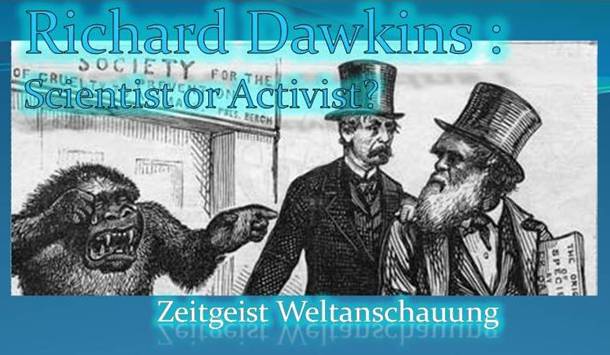You can visit my new homepage, True Freethinker, via this feed
Sunday, November 16, 2008
Richard Dawkins - Children in the Atheist’s Den, part 2 of 8
Please note that this essay is being moved and will be shortly reposted at True Freethinker
Labels:
atheism,
biology,
darwinian,
darwinism,
new atheist,
pz myers,
richard dawkins,
science
Subscribe to:
Post Comments (Atom)

 Get my ebook, "The Apocryphal Jesus," here
Get my ebook, "The Apocryphal Jesus," here

"What might Prof. Richard Dawkins end up teaching to little children considering that he infers atheism from a study of biology as filtered through Darwinism?"
ReplyDeleteI'm not sure why you ask this question since everyone can see what Dawkins does, in fact, teach by just watching the videos.
"He has taken it upon himself to tell children that he and his fellow scientific cenobites will answer all of humanity’s deepest questions about life."
No, he is clearly responding to the claim people often make that science is limited to asking particular types of question. He doesn't say that scientists will answer these questions, but that if it turns out that science can't, then it is certain that no other discipline can. You might argue with that statement, but at least it is the one Dawkins is making. He's saying that there aren't, as many people have claimed, different ways of ‘knowing’. There's only one method that can be reliably used to ensure in the long run that you're not fooling yourself, and that's science.
"Yet, we should never base our worldview on science because science can only tell us our best guess thus far and is necessarily tentative."
I would argue that this is the *only* premise we can honestly base our view of the world on. Deciding in advance how things are and insisting that view is true regardless of evidence seems misguided at the very best and blithering at worst. By contrast, science relies on evidence. If new evidence turns up, scientists will change their minds. In other words, as we learn about the universe, our understanding of how it all fits together changes. I'm sure I don't need to contrast the utility of this with the alternative of deciding in advance how everything is and ignoring evidence to the contrary.
"Absolute uncertainty and tentativeness appears to be the best for which one could hope in a worldview based on “science.”"
This is an obvious and clumsy strawman. "Absolute uncertainty" would not be very useful and is not the logical conclusion of a scientific way of looking at the world. To explain this properly, I'd have to go into how the scientific method works and this already long comment would become huge. Suffice to say for now that some things are more certain than others, based on the quality and quantity of the evidence that supports them. There are some things that are pretty certain (gravity, evolution etc.) and some things that are less so: all based on the amount of evidence we have for those theories.
"Alright children, now you know that you are machines whose purpose in life is to copulate. But remember, whatever you do: do not ever, never ever, behave as if you are machines whose sole purpose is to copulate."
ReplyDeleteYou are confusing different ideas of 'purpose', which is strange because Dawkins always goes to great pains to prevent this kind of misunderstanding. Only poor comprehension skills or disingenuous quote mining could account for this.
If you read his work honestly, you'll see that he sometimes uses 'purpose' in a teleological fashion for the purposes of narrative flow: when he says that the 'purpose' of people is to reproduce, he's speaking as if genes could think and have desires. He doesn't for a second think this is true, but uses it to explain a particular way of looking at evolution. This should in no way be confused with the sense of purpose a person might possess. Individuals have desires and usually a sense of purpose. This is different to the technical meaning I've just described. In fact, in many of his books, Dawkins goes into great depth about the difference between these uses of the word 'purpose'. He's a strong proponent of the idea that it's a good thing for people to have a purpose and to pursue it.
"Prof. Richard Dawkins, PZ Myers, and many, many others use, or abuse and misuse, science as a way to smuggle atheism into the science classroom. Their books, lectures, classes and interviews are a tangled web of science and atheism."
This is going to need some backing up. I would be very surprised indeed if Dawkins or Myers promoted atheism in the science classroom. You should provide a basis for this accusation. Let me point out again that as far as I remember, Dawkins does not mention religion or promote atheism. If I'm wrong, please go ahead and point out where he does.
"Little unsuspecting children are not likely to be able to discern when something being presented to them in this manner is observation/experimentation based or when it is atheist activism."
Perhaps not, but you've yet to make it clear that anything Dawkins said in his Christmas Lectures was 'atheist activism'.